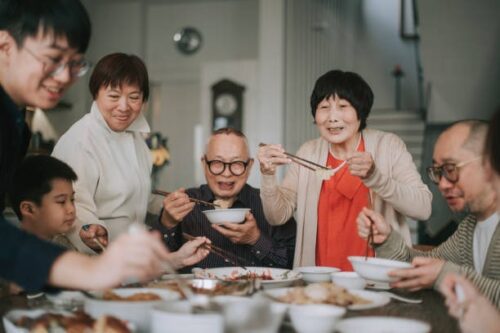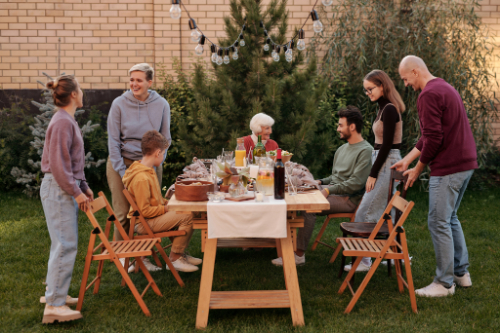It’s that time of year again when a lot of us begin searching for a meaningful present to offer to an elderly relative. However, giving someone something to make them smile can be nice. And it’s even greater when a gift aids an elderly individual’s daily well-being in some other way, such as being useful or practical. There’s something on the shopping list for the best gift that fits their interests and hobbies.

Give a meaningful gift to honor the special elderly in your life. It might be a surprise, a retirement present, a birthday present for granny, or a congratulatory present to new grandparents. Yes, selecting a suitable present for senior citizens might be a challenging task. Many older adults believe they have too much stuff and would much rather give it away than pay more.
Even though we say that these presents are ideal for people age 65 and older, it isn’t a strict guideline. Thus, rather than spending hours looking for the ideal present, why not look over the following gift ideas of the top presents for older adults?
Spa Treatment Day
Having a healthy heart is essential to live a long and fulfilling life. Therefore, nothing compares to getting multiple massages, body wash treatments, and mud baths in one day. Your elderly loved one is deserving of some downtime. They will have a great time at the spa and feel rejuvenated, ready to take on the outside world with fresh skin, relaxed muscles, and a positive outlook. A relaxing massage can be immensely soothing but can also help older women and men by promoting better blood flow and circulation.
Spa treatments may aid your elderly in preventing heart disease and enhance cardiovascular health by decreasing blood pressure, increasing circulation, and controlling heart rate. This aids in their body’s defense against disease. The heart, lungs, and muscles can all operate normally.
Musical Gifts
Seniors can unwind and reminisce about their best times by listening to music. Also, there is evidence of the benefits of music therapy for elderly dementia patients. You can buy merchandise, tracks, or a live performance DVD from elderly friends’ favorite recording artists. Alternatively, consider getting a little vintage music box for a present.
While MP3s and CDs are fantastic and good gifts, a record player could be the ideal present for the senior who enjoys music if you intend to bring back some fond memories. When selecting the finest record player, there are many options available. It is straightforward to pack away and store because of its small, portable size. It comes in different ranges of colors. Also, it features built-in speakers, so all your elderly loved ones need to do is plug it in, select their preferred record, and start listening to the best music they like.

Comfortable Recliner
Your beloved seniors deserve to relax in their favorite chairs because they have worked hard. Choosing an unsuitable recliner, however, could have long-term effects on their well-being and comfort. Modern recliners are designed with ergonomics in consideration, allowing your elderly loved ones to unwind for as long as they’d like to.
Elderly recliners are more than just comfortable armchairs with customizable backrests. They greatly enhance patients’ quality of life by providing more comfort and movement at the push of a button. It can ease back pain, lessen muscle stress and tension, lessen acid reflux, keep a straight posture, and enhance digestion.
Electronic Back Massager
Consider purchasing an electronic back massager for your seniors if you cannot afford the lavish spa service. Massage has been shown to enhance circulation and blood flow in an older adult, lowering blood pressure and promoting the healing process of other chronic symptoms. It is additionally demonstrated to benefit elderly people with arthritis and other persistent discomfort. Indeed, massage treatment has beneficial effects on almost all of the human body’s systems.
In addition to relieving shoulder, neck, and back discomfort, massaging the body’s soft tissues can assist in lowering stress. For seniors, back massages can improve overall wellness and mental and emotional health. This product can also aid with health challenges as it helps improve quality of life by lowering pain and swelling, boosting quality sleep, and reducing anxiety. With the convenience of their own homes, older adults can reap a few positive effects of massage therapy using electronic back massagers.
Activity Books Or Games
Playing games is a great way to keep the mind active and entertained. In addition to looking through the top board games for seniors, try these fun activity suggestions, including adult coloring books, Jigsaw puzzles, and paint-by-number books. Basic to beautiful are just a few inventive board styles available. A deck of cards, score pegs, game instructions, and everything else your elderly loved one needs for a game are all included in many game boards available in the market.
However, sudoku or crossword puzzles are the ideal options that you should take into consideration. This is so that elders can continue to enjoy themselves and retain their mental abilities while solving problems. This allows them to learn a new skill, reduce anxiety, and have fun with friends or the ones they knew from nursing homes. While standard puzzles from the shop work just fine, a personalized piece will leave a lasting impression. For a thought-provoking trip down memory lane, you may purchase a puzzle featuring your family member, their preferred spot, or a cherished pet for your beloved seniors.
Something Useful
A present that makes someone’s life easier imparts wisdom, and promotes happiness and relaxation is always a good idea. It’s important to take into account not just your loved one’s needs and abilities but also their interests, hobbies, and personal preferences. A handheld vacuum cleaner, an Amazon Echo, an electric toothbrush or water flosser, a French press espresso maker, an automatic mug for a coffee mixer, a food processor, and other thoughtful present ideas for your senior loved one, especially your mom.
A few ideas for the ideal gifts for seniors always make their daily lives easier. Some examples of more stuff are automatic jars and can openers, dressing sticks, extended zipper pulls, automatic night lights, electric blankets and mattress pads, automatic lamps, slip-on shoes, elastic shoe laces, and many more. Providing a practical present is not much of a headache, as long as you understand which items older people prefer.
Non-Slip Shower Mat
The aging process weakens the bones of older people. Senior individuals are more susceptible to more serious accidental injuries. But with a non-slip shower mat, your elderly loved ones can safely enter the bathtub or shower without running the risk of a catastrophic fall. As these older adults proceed with their morning ritual, they will have one less worry, thanks to this present.
The primary function of a bath mat is to offer a non-slip surface for seniors to walk on following their bath or shower. Preventing accidents is beneficial, particularly for elderly individuals with limited mobility. For safety, they usually include non-skid characteristics and are highly absorbent. Additionally, bathroom mats absorb spills and extra water, keeping floors dry, clean, and mildew-free. They are essential since they improve the hygiene of your seniors’ environment.
Doorbell Camera
Suppose your elderly loved ones have trouble walking or using their hands. In that case, a high-quality doorbell camera can help them safely and easily check who appears to be ringing the doorbell, check what’s going on, and receive deliveries without forcing them to rush to unlock the door. Your seniors will appreciate seeing who is at the door and talking to them without having to get up and answer the door since it allows them enough opportunity to determine whether it is safe to do so.
Not only does this helpful technology offer older adults a tremendous sense of security and safety, but it also gives their loved ones peace of mind. Most video doorbells can be recorded at night, so the elderly can see who is at the door even when it is dark outside. It would be much more convenient.

Gift Cards
When making purchases, prepayment cards like gift cards can be accepted instead of cash. It usually has a set amount of money attached to it, allowing the recipient to select from various services or products within the specified amount. When selecting a gift card, it’s crucial to consider an older adult’s demands and interests. Gift cards to department stores, bookstores, and grocery stores are a few common choices. These can allow older individuals to select what they need or prefer.
And since choosing a restaurant to visit can take a lot of time because so many individuals enjoy dining out. Your senior loved ones can have a wonderful dinner at one of their favorite dining establishments with a great gift card to a top-notch restaurant. Giving seniors gift baskets of cards is a useful present that they will utilize for their own needs.
Final Thoughts
Give your senior loved ones any of these lovely presents. But always remember that being there for them, paying attention, and being patient with them is one of the best presents you can offer. You can always communicate with them through a video call, email, and text messages. Those are valuable to your loved one’s preferences and will always have an impact. But regardless of whether you buy a useful holiday gift ideas or not, your elderly will appreciate whatever it is that you give them as long as you do it wholeheartedly. Don’t forget to take selfie photos for remembrance.
Frequently Asked Questions (FAQs)
How Do You Convince Older Parents They Need Help?
How Do You Deal With Unreasonable Elderly Parents?
How Do You Survive Caring For Elderly Parents?
How Can We Take Care Of The Elderly At Home?
Why Is It Important To Take Care Of Elderly?
How Should The Elderly Be Treated?
How Do You Cope With Taking Care Of Your Parents?
Are We Obliged To Take Care Of Our Elderly Parents?
Why Is It Hard To Take Care Of Elderly Parents?
How Do You Deal With A Stubborn Elderly Mother?
How Do You Deal With A Difficult Parent With Dementia?
































